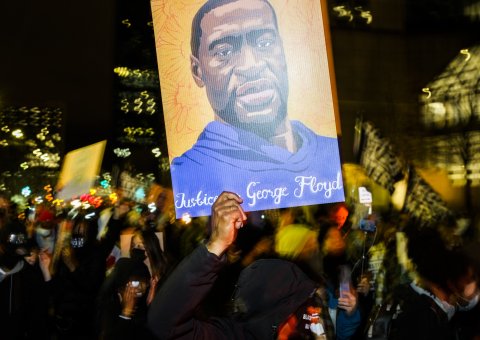As a practicing lawyer of 49-plus years in Los Angeles, in March of 1990 I became involved in the tragic case of Rodney King. Although Mr. King was my most notable client, I have represented numerous individuals who were assaulted and killed at the hand of police officers, and have tried these cases in both state and federal court.
Now that the trial of Derek Chauvin has resulted in the jury finding the former police officer guilty on three charges—including second-degree murder—we can see how far our nation has come since the Rodney King beating.
Officers from multiple law enforcement agencies pulled over Mr. King following a pursuit on a California freeway. He was suspected of speeding, and possibly driving under the influence. Mr. King also had two African-American friends in the vehicle he was operating. Following the pursuit, he pulled over and immediately encountered four Los Angeles Police Department (LAPD) officers, among officers from other agencies, who senselessly beat him with their police batons. Officers struck and clubbed Mr. King approximately 56 times. He sustained significant and permanent injuries to his skull and body.
As fate would have it, a bystander with a video camera (cell phones did not have video capacity at that time) filmed the beatdown. An LAPD helicopter hovering over the scene illuminated the whole gruesome scene. The video was aired all over the nation, and has been replayed by thousands of networks across the world. People worldwide saw the shocking video, which forced them to wonder how the beating could happen in America in the 1990s.
The officers who beat King—all of whom were white—were eventually charged criminally. However, although the King incident offered the first actual video of a police beating, the jury in the trial of the four officers refused to convict any of them, even after seeing the horrifying video over and over.

The trial of Derek Chauvin in Minneapolis had a far different outcome—the conviction of Chauvin. Both the Rodney King and George Floyd videos caused great outrage around the world, particularly among communities of color. Both cases led to outbreaks of violence in America, including looting and riots in cities around the country.
I immediately observed several similarities between the two cases, along with one glaring difference: social media sent the Floyd video instantaneously around the world. The Floyd case became a rallying cry for various social groups, including Black Lives Matter. Politicians became involved, and the entire concept of justice for "black America" took over the mainstream dialogue of the country. Of course, in the meantime, many more African American men have been killed by police. In the 30 or so years since the King case, countless officer-involved shootings of black men by white police officers have resulted in violent riots.
Another major difference between the criminal trial of the officers who beat Rodney King and the trial of Derek Chauvin is the overwhelming amount of external pressures that likely encouraged the jury in the latter to secure a unanimous verdict of guilty on all three counts. During the trial of the officers in the Rodney King case, the federal judge put a stay on the civil proceeding until the trial of the officers concluded in order to dissuade any potential bias. However, this was not the case with Floyd—the announcement of the $27 million to Floyd's deserving family came on the eve of Chauvin's trial.
In addition, numerous statements by high-profile political figures may have helped seal Chauvin's fate. These included emotionally charged press conferences by Al Sharpton, who was accompanied by family members of others who lost their lives to police violence. Most notable were the inflammatory remarks from California congresswoman Maxine Waters and Nancy Pelosi, Speaker of the U.S. House of Representatives.
One thing that remains constant is that racial divisions in America are just as pervasive as they were back in the '90s. These unfortunate incidents include many different racial groups, and frequently involve African Americans as the victims of police brutality and racism. In the decades since the Rodney King beating, dozens of videos have surfaced evidencing clear police misconduct and apparent racism at the hands of police officers. I believe the Chauvin conviction is a small step toward radical social change, but we continue to see police killings since the trial started, and many more unfortunate individuals may be subjected to police misconduct. Unfortunately, it is all too easy to imagine a bleak future that perpetuates more of the same. More has to be done to educate police departments on how to properly train their officers, and to introduce a more stringent hiring process to better weed out potential "bad egg" recruits.
Steven A. Lerman is an attorney in Los Angeles and the former lawyer for Rodney King.
The views expressed in this article are the writer's own.














